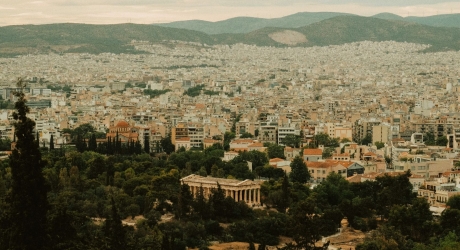There is no doubt about the fact that the terror attacks being made worldwide are highly condemnable. However, the big question in the minds of everyone is how to solve this problem? People the world over are trying to find a solution to this menace. On the one hand, the authorities are trying to crush the terror menace through legal action; and on the other hand, reformers are trying to curb it by engaging in condemnation. However both of these methods are, apparently, proving to be ineffective. Then what is the solution?
According to me, the present problem of terrorism is based on an ideology and an ideology cannot be countered through legal action or by mere condemnation. We have to develop a counter-ideology to overcome it.
According to the UNESCO, 'Violence begins from the mind', it has to, therefore, be uprooted from the mind itself. This I feel succinctly captures the very root cause of terrorism. Therefore, in order to eliminate this root cause we need to initiate our efforts by beginning from the right starting point - that is, re-engineering of minds of individuals by taking them away from the culture of violence and bringing them closer to the culture of peace.
To explain the importance of the above, let us take two parallel examples from history. One of the American campaign against Communist Russia and the other of the American campaign against Saddam-led Iraq. While the US was successful in curbing the menace of Communist Russia, the same America failed to cope with the menace of Saddam-led Iraq. This is because America met the Russian challenge at an ideological level while it opted for military action against Saddam's Iraq.
According to me, terrorism will persist in one form or another until the ideology of violence is countered with another ideology based on peace.
Ideology of Violence
The ideology behind present day terrorism is that, Islam being a political system, it is the duty of all Muslims to establish Islamic rule in the world. This thinking was not prevalent during the time of Prophet Muhammad. It is a later innovation which was developed in the last few centuries by a handful of people. Having become wide spread in the Muslim world today, it is leading to present-day violence. It has influenced many Muslims, especially the easily influenced youth, and they have become obsessed with trying to establish the political rule of Islam, thinking it to be their ticket to paradise. Failing to achieve this objective by the peaceful method, they have started resorting to suicide bombing. The idea being that if we cannot eliminate the non-Islamic rule, then let us at least de-stabilize it and pave the way for Islamic rule.
I have studied Islam through its original sources - the Quran and Hadith - and say with certainty that this political interpretation of Islam is an innovation and the real Islam is based upon peace, compassion and tolerance.
Ideology of Peace
Peace is not prevalent in the world as people the world over are acting intolerantly and indulging in acts of violence, saying, "Give us justice and peace will ensue." But when people, ostensibly seeking justice, stoop to violence, peace can never prevail. Peace is always desirable for its own sake, and every other desirable state comes after peace, not along with it. So, the maxim I follow, when peace is the desired state, is: Ignore the problems, and avail of the opportunities.
Once people become tolerant and obtain peace for its own sake, it opens up opportunities, which enable people to strive for their ideals, eventually attaining justice and other constructive ends.
This is ideology of peace that can counter the ideology of violence and it is based on the original sources of Islam. The Prophet of Islam provides a very clear historical example of this in his method of negotiating of the Hudaybiya peace treaty by unilaterally accepting all the conditions of his opponents. The Prophet, while not receiving justice or his rights, gained a 10-year no-war pact. This gave him and his companions an opportunity to work uninterruptedly on a constructive programme. Using this peaceful non-political programme, they were able to consolidate themselves so thoroughly that without waging war, they acquired Makkah peacefully.
From this example of Prophet Muhammad, we can understand that Islam is a completely peaceful religion and the Islamic method is a completely peaceful method.
What Can be Done?
Now the question is, what can be done in the present alarming situation? What is the practical solution to the present state of affairs? I think that there are two parts to this solution-
Fifty per cent of the solution depends upon the work of government agencies, with the remaining fifty per cent left to non-governmental organizations.
In every country, there are strict laws to curb violence and terrorism, but they are of no avail unless they are enforced by governmental agencies. All those elements who are involved in heinous acts of terrorism must be punished in a fitting manner.
The second half of the task pertains to the re-engineering of the minds. This task must be undertaken by agencies that are non-governmental in nature. An entirely peaceful task, the re-engineering of people's minds can be achieved only through education and positive training, which will naturally include a counter-ideology. Once this is done, the ultimate peaceful result will be achieved only through the combined efforts of two agencies- both governments and reformers.
The common man in every community also has an important role to play in this process. One important aspect of this role is not to believe in rumors. Do not believe any information which is purportedly genuine, unless a thorough enquiry has been made into it. This habit will remove the misunderstandings prevalent on both sides: history shows that it is misunderstandings that have always led to violence and war.
In Conclusion
The ideology of peace in Islam banishes the notion that there can be anything acceptable about terrorism. Islam is a completely peaceful religion and the Islamic method is a completely peaceful method. By following the ideology of peace, each individual's mind can be re-engineered away from the culture of violence and closer to the culture of peace.











